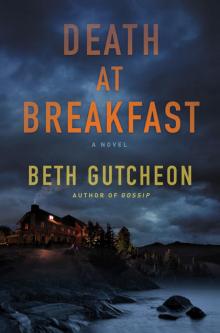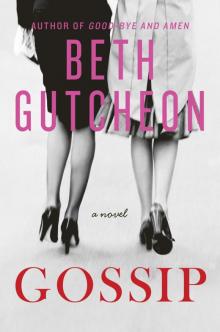- Home
- Beth Gutcheon
The Affliction Page 14
The Affliction Read online
Page 14
“Go away,” Hope called. Maggie laughed.
“Are you sure I can’t help?” she said through the door. Knowing the inn was virtually empty saved her from being embarrassed to stand shouting in a drafty hallway.
“Not unless you know a good drug dealer,” Hope yelled back from where she lay. In truth, she was feeling a little better and watching an episode of Foyle’s War on her iPad, but she still didn’t want to get up to open the door.
“Text me if you need anything,” Maggie yelled, and left her.
Emily George was waiting for Maggie at The Boathouse, a barn of a restaurant and wedding venue down by the river. The view was spectacular, though Mrs. George was sitting with her back to it, frowning and tapping frantically on her phone as Maggie joined her.
“Everything all right?” Maggie asked her employer as she took her seat.
“Yes. Well no. . . . It’s just . . . Cleo. My daughter.” Emily looked frustrated and put her phone away.
“She’s a junior, isn’t she?”
“Yes. She needs to shine this semester, but the girls are all overexcited, believing crazy things, egging each other on.”
“What dorm is she in?”
“Sloane One. She wanted a coed school, to tell the truth, but she’s not the strongest student and I thought this environment would help her focus.”
“And has it?”
Emily just looked at Maggie over the top of her glasses and gave a sigh.
A waiter arrived and they made some decisions about what to eat and drink.
“Anyway,” said Emily, changing the subject. “I had a visit from Hugo Hollister. He’s upset that the police let Ray Meagher go. Ray’s on the auxiliary police here in the village.”
“I know that,” said Maggie.
“And Hugo thinks that they’re treating him as one of their own. The police. Is there anything we can do?”
Maggie thought about breakfast with Bark and Phillips, and the detectives’ obvious suspicion of her and Hope. Not that she blamed them, but she didn’t think they’d welcome suggestions of that nature from her. “Early days. What are your other concerns?”
“Number your paper from one to twenty,” Emily said. “Lyndon McCartney is up to something. I thought it would help our relationship with the town when he joined the board, a local businessman. Plus we always need people who can read a balance sheet. God knows it’s not one of my long suits. But I think he’s spreading rumors that the school is going to close.”
“That’s a four-alarm fire, if true. What’s your procedure for removing trustees?”
“I have no idea.”
“But they all sign pledges against self-dealing?”
“Yes.”
Maggie looked relieved and made a note. “Good. What else?”
“I’m told that several girls we don’t want to lose are looking at other schools.”
“You’ve had requests for transcripts?”
“We have.”
Maggie knew that given the state of the budget there weren’t any girls that they wanted to lose, but that wasn’t the real danger. You could get a cascading loss of confidence if a critical mass started transferring, and critical mass didn’t have to be all that big.
“Florence’s funeral is going to make a difference,” Maggie said. “She loved the school and wanted it to succeed. Christina will make it a teaching moment.”
“Will she?” Emily George asked doubtfully. The woman looked to Maggie as if her stomach lining was dissolving as they spoke.
“She will. She’s a good hire, she just needs a little breathing room.” Maggie hoped she wasn’t lying. Fortunately the waiter arrived with their drinks, and they could take a moment to raise a glass to each other. Or to happier days. Or to something.
After this brief moment of relief, Maggie said, “I’m afraid there’s something else.” She explained about the TickTalk situation.
Emily said, “Not again.”
“A culture of bullying really can be fatal to a school, but so far it’s a worrying outbreak, not a pandemic.” Maggie had once seen a school lose half its fifth grade, when one mean girl dominated an attack clique. So many girls withdrew to escape them that then the clique left too, because there weren’t enough girls in the class. The boys stayed but were plenty confused and unhappy.
“What can we do?”
“Plant your flag on your principles, and your history. Persuade the girls themselves to act as antibodies against the virus. Beyond that there may be something I can do, but I don’t know yet, so stay tuned. I do have some good news. I think I’ve found you a replacement for Florence Meagher,” Maggie said.
Emily looked at her as if she’d just heard the sound of the cavalry’s bugle and thundering hooves beyond the rise.
“A master teacher who retired last year because her husband wanted to travel. Three months later he died. She’s seeing Christina this afternoon. The girls will love her.”
Chapter 8
Tuesday, April 28
While it was far from the only mess of pottage on their burners, Detective Bark and Detective Phillips had made some interesting discoveries about the Meagher case. They had known before they sent Ray Meagher home on Saturday that he hadn’t been at Jersey Boys the night before Florence’s body was dumped in the pool. They knew he wasn’t registered at the Clinton Hotel, although he was known there; the desk clerk recognized his picture. The hotel knew Guy Thompson as well; he had stayed with them Thursday night. By Monday afternoon, Detective Phillips had reached Thompson through his airline. He was in Denver. He said he had called Ray to see if he’d like to get together on that Thursday but Ray told him that he’d be out of town. He and a pal were going somewhere to play the slots, he said. Where? Detective Phillips had asked. Guy Thompson said he had no idea. He himself had ordered takeout and spent Thursday night in his room.
“What’s our next move?” Evelyne asked. “We could start calling the casinos within a half day’s drive . . .”
“You got an idea how many there are?”
“None.”
“Or how many crappy motels there are around them where gamblers stay?”
“No . . .”
“Me either. Let’s try the easy way first, go see how hard it is to get Ray Meagher to spoil his own day.”
Ray was sitting at his kitchen table Tuesday morning in the mangy sweats he slept in, eating a microwave pizza for breakfast and drinking a lukewarm Coke, when he saw Bark’s sedan pull into his driveway. He watched through the kitchen window as Bark and Phillips got out and started for his front door. With the piece of pizza still in his hand, he opened the back door and called angrily, “Do you mind? I haven’t even brushed my teeth yet!”
“No, we don’t mind,” said Bark cheerfully, changing course for the back door. “That your breakfast? Got any coffee?”
They pushed past him into the kitchen, making the little room feel full to overflowing.
“If I had coffee, would I be drinking Coke?” Ray asked rudely.
“I have no idea,” Bark said, gazing around with interest.
“Someone left something on your front stoop, looked like a casserole,” said Phillips. “You haven’t been out?”
“Uh. No, I was going to—this morning.”
“You want me to bring it in?”
“I guess.”
She went out the front door and was soon back with a Pyrex dish full of macaroni and other less-identifiable matter. There was a note taped to the aluminum foil that covered the top. It said, “Deepest sympathy. Marcia and Jesse. PS, leave the dish outside when you’re done. I’ll come for it. M.”
“Marcia and Jesse,” said Phillips. “Would that be Marcia and Jesse Goldsmith?”
“I guess it must,” Ray said, ungraciously.
“This looks like it’s been rained on. I wonder how long it’s been out there,” she said, lifting more of the aluminum foil and poking a finger into the casserole.
“Do you mind?” sai
d Ray again, looking at the food. He hadn’t eaten anything in days that hadn’t come from his freezer, and not all of it had been in the best condition.
“I wonder if there’s mayonnaise in there,” said Bark. “Mayonnaise or cream. Isn’t that the stuff that gives you food poisoning if you leave it out of the fridge?”
“Bound to have one or both, from the look of it,” said Phillips. “It’s thick, and it’s white. Up to you, Ray, but I’d throw that right out.”
“Is there something I can help you with?” Ray asked, with ill-concealed anger.
“Go on with your breakfast, we already ate. We just have a few questions.” Bark sat down in the chair opposite Ray. Phillips squeezed by and opened the refrigerator.
“What is your problem?” Ray suddenly roared. “I’m not running a restaurant here. I don’t have to pass inspection, do I?”
Phillips stood with the refrigerator door open, contemplating. She leaned over to open the vegetable drawer, made a face, and closed it again. “You’re going to have to empty that and soak it, that does not smell good. I hope you have some bleach—”
“Don’t you need a warrant or something to come in here and jack me up before I even . . .” He was sliding into bullying mode, something that Phillips had already suspected was habitual with him.
“You invited us in,” Bark said pleasantly.
“I did not!”
“I thought he did, didn’t you, Phillips?”
“I did not invite you in!”
The detectives looked at each other.
Ray said, “Look, just tell me what you want, then get out of here. It isn’t the best of times for me, you know?”
“We do,” said Bark.
“We know, it’s been a very confusing time for you,” said Phillips, straightening and turning to face him. Her tone was suddenly all-business. “Lot of confusion. Yes?”
Ray put down the piece of pizza he’d been holding and said to no one, “Oh, fuck.”
Phillips went out and came back with a side chair from the dining table, and sat down beside Ray. The effect was like plugging a bottle’s neck. Ray was trapped with his back to the kitchen door and nowhere else to go.
“We talked to your man Thompson,” said Bark. “He said he wasn’t with you Thursday night.”
Ray just sat, stone-faced.
“He was in New York on Thursday, at the Clinton, but not with you.”
“He said you were off somewhere, gambling,” said Phillips.
There was a silence. What had he thought, that they wouldn’t check?
“Is that what happened, Ray?”
“You went someplace to play the slots?”
“All by yourself?”
“Or with a friend?” Phillips made the word friend sound like the already failed gambit of a notorious liar.
Silence. Ray fidgeted, and his eyes darted briefly from the ceiling toward the door into the living room.
“Or did you murder your wife, Ray? Is that what happened? You strangled her, maybe on purpose, maybe by mistake, and then you had to take her somewhere, to figure out what to do with the body?”
“Of course I didn’t murder my wife!” he yelled.
“Why of course? You lied about where you were. You have no alibi. You were known to have fought with her repeatedly—”
“Who told you that?” he snapped.
The detectives both stared at him. They didn’t move or blink.
“Who told you that? Those little cunts from the dorm?”
“Language, Ray,” said Bark, tipping his head toward his partner.
“Or her sister. That pious bitch . . .”
Phillips raised an eyebrow. She was good at that, she could move one eyebrow up to speak a question while the rest of her face stayed still, and the question the eyebrow asked was “Really? Is that the tack you’re going to take?”
There was another long silence as Ray stared defiantly and the two detectives waited. Finally Ray said, “I have to go to the bathroom.”
Phillips and Bark looked at each other. Finally, Bark twitched a shoulder toward the door, and Phillips went out. There was a half bath behind the kitchen, hardly bigger than a broom closet, with a toilet and a tiny sink, stained and chipped, fitted into the corner because there wasn’t room for a full-size one opposite the flush. There was a tiny window high up in the wall; no possibility of escape that way. She checked behind the toilet and took the top off the tank to be sure there was nothing hidden in there that he could use to make trouble for them. She made sure the small smudged mirror was attached flat to the wall, not concealing a cabinet. Then she went back to the kitchen and made a gesture to Ray: be my guest.
Ray stood and made his way past the kitchen table and both detectives followed him. He went down the brief hallway and into the tiny bathroom, where he closed and locked the door. Bark and Phillips stood outside the door. After several minutes, Ray called, “Look, you know I can’t go anywhere. Could you please move off?”
Then they heard the taps turned on to muffle whatever noises might be produced during his mission.
The two detectives moved several feet down the hall. Phillips called, “Is that better?”
They got no answer. After several more minutes, the taps were turned off, the door unlocked, and Ray emerged, drying his hands on his sweatpants.
Instead of going back to the kitchen, he went into his den and sat down on the sofa that concealed his porn stash. Phillips and Bark followed him and sat down as well, Phillips in the plaid armchair facing the TV, Bark on an old office desk chair that he rolled out from a corner.
Ray said, in a new man-to-man tone he’d thought through in the bathroom, “Look. I’d been under some pressure, okay? We’d had a couple of rough days. My wife went off in a snit, and I thought I’d give her a dose of her own medicine.”
“So you went off in a snit too?”
“I just decided to go off and let her see what that felt like.”
“Your wife disappears on a day you know she’d been preparing for, for months, and you weren’t worried about her?”
“No! She’d been . . . I mean we’d . . . I mean no, I wasn’t worried. I thought she’d gone to her sister’s.”
“Because this had happened before?”
“Once. Yes. I mean, sort of.”
“She disappeared on a school day without telling anyone where she was going?”
“Stop putting words in my mouth! Once before she went off to her sister’s and we had a time-out.”
“Sounds like Romper Room,” said Bark.
Ray swung his whole upper body toward Bark, as if he were trying to loom over him, threatening, without getting up.
“What about this pressure you’ve been under, Ray?” Phillips asked.
“It’s business. I have a business deal going down to the wire, and it’s a lot. Of pressure.”
“What kind of deal?”
“Real estate. We’re putting together a package to develop. We have expensive options that will expire if we can’t . . .”
He stopped and looked confused, not sure if he should be talking about this. Suddenly he changed course. “Look. I’m bereaved, here. I’m in mourning right now, I lost my wife, do you mind? Why are you sitting here in my house, why aren’t you trying to find out what happened to her?”
“Who’s this ‘we,’ Ray?”
“What?”
“‘We’re putting a package together.’ You and who else?”
“My partner, Lyndon McCartney.”
“And what is this package?”
“Look, am I under arrest?”
“Not at the moment. Why?”
“Then I don’t have to answer your questions and our business is none of your business.”
Bark and Phillips looked at each other. Then they each took out a notepad.
“So, you went off in a snit to gamble on Thursday night, is that right?”
“I was not in a snit!” Ray yelled, in a snit. “I like
to gamble. It relaxes me. It’s harmless.”
“Really? You win all the time?”
“Not all the time. But enough.”
“So why did you tell us you went to the show?”
“My wife is a prude about gambling. That was what I was going to tell her. She’d never have checked. Then when . . . when she died and you were all ‘Where were you last night,’ I just . . . it was what came to mind. It just came out. Look. I went to a casino with a friend. I have an alibi. I didn’t do anything wrong. Why the hell are you messing me over, why don’t you go talk to that creepy little shit Jesse Goldsmith, for instance? There is a real fucking whack job, for you. He said horrible things to my wife! She was terrified of him!”
After a pause, Bark said, “Jesse Goldsmith who leaves you casseroles?”
Ray made an annoyed gesture. “Marcia Goldsmith is a friend of Floro’s. Her creepy son is so weird they had to take him out of school. So of course Florence had to make a pet of him. She would. He even scares me, that kid. You know what he did this week? He was up at the pond at the cemetery, blowing up frogs with firecrackers!”
“Really? You saw him blowing up frogs with firecrackers?” Phillips asked.
“Not me, that Detweiler woman did, she came down to the firehouse to try to make us do something about it. Who the hell is she, by the way?”
“A kid blowing up little animals? I’d tell somebody if I saw that,” said Phillips.
“What did you do about it?” Bark asked.
A pause. “Nothing. We’re auxiliary, what could we have done?”
“How about tell the boy’s mother?” Phillips asked.
And Bark said, “Ray—who did you go to the casino with?”
* * *
For anyone but Hope, it would be a misfortune to be stuck in an elevator, especially when feeling fragile after a painful visit to the chiropractor. Lenore, the young slave of all work at the hotel, had recommended a practitioner in the village who had fixed her brother when he had his frozen shoulder. Hope was in the man’s treatment room by eight-thirty Tuesday morning.
The practice was in the village’s office and medical building, a newish square yellow brick edifice upstream from the movie theater. The chiropractor, pudgy and pink-faced, wearing a white jacket and crepe-soled shoes, was called Dr. Aker. He spoke to her at an uncomfortably high volume, as if anyone with misaligned vertebrae must by definition be hard of hearing, even though she mentioned that she was not. Hope found his technique terrifying, but after forty-five minutes of being prodded and leaned on and given sudden and violent jerks of various body parts, she had to admit that her pain had transformed from piercing to semibearable.

 The Affliction
The Affliction Dead at Breakfast
Dead at Breakfast Good-bye and Amen
Good-bye and Amen Leeway Cottage
Leeway Cottage Gossip
Gossip Saying Grace
Saying Grace